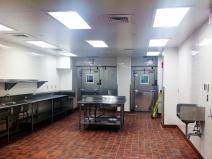Spangler Kitchen - HBS
Spangler Kitchen - HBS
Project highlights
- 26% reduction in water usage compared to an Energy Policy Act of 1992 baseline
- 13% reduction in lighting power density
- 83% of the on-site generated construction waste was diverted from landfills
- 19% of the total building materials content by value have been manufactured using recycled materials
- 44% of the total building materials value includes materials and products that have been manufactured within 500 miles of the project site
Project summary
Spangler Hall, located in the Harvard Business School (HBS), is a 122,000 square foot, brick and limestone building that serves as the main student center. The building has 29 project rooms, a 350-seat auditorium, administrative offices, student lounges, a business center, and kitchen and dining facilities. The dining hall, located in the basement level, averages over 2,000 visitors a day. HBS identified the opportunity to renovate the existing kitchen to not only increase the overall building performance, but also to improve occupant comfort. The renovation included upgrades to HVAC, lighting, plumbing, and kitchen equipment. The HVAC systems were modified to improve occupant comfort, provide healthy indoor air quality, and perform at a high level of energy efficiency. The lighting systems were also designed to reduce energy use, while providing adequate lighting spaces for the spaces.
The project’s design went beyond improving energy performance and included an extensive composting program. At the Spangler kitchen all the food waste is collected on a daily basis and composted. Additionally, all unsold food items are also composted at the close of the business day. The composting program helped the dining hall achieve the Green Restaurant Association’s Green Restaurant Certificate, earning 3 Stars for sustainable restaurant management. LEED certification also played a critical role in the design of the project, which was achieved through an integrated design approach. Applying sustainable design strategies in a holistic manner ensured that all aspects of the design contributed to decreasing the environmental impact of the kitchen. All project stakeholders were involved in the decision-making process, from designing the layout of the space to selecting the new kitchen appliances. HBS is committed to reducing greenhouse gas emissions, and the renovation of the Spangler Hall kitchen is an important step in achieving this goal.


